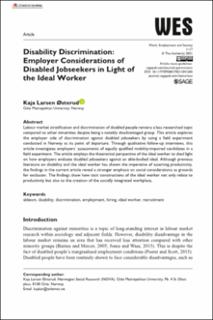Disability Discrimination: Employer Considerations of Disabled Jobseekers in Light of the Ideal Worker
Peer reviewed, Journal article
Published version
Permanent lenke
https://hdl.handle.net/11250/2988575Utgivelsesdato
2022-02-21Metadata
Vis full innførselSamlinger
Originalversjon
https://doi.org/10.1177/09500170211041303Sammendrag
Labour market stratification and discrimination of disabled people remains a less researched topic compared to other minorities despite being a notably disadvantaged group. This article explores the employer side of discrimination against disabled jobseekers by using a field experiment conducted in Norway as its point of departure. Through qualitative follow-up interviews, this article investigates employers’ assessments of equally qualified mobility-impaired candidates in a field experiment. The article employs the theoretical perspective of the ideal worker to shed light on how employers evaluate disabled jobseekers against an able-bodied ideal. Although previous literature on disability and the ideal worker has shown the imperative of asserting productivity, the findings in the current article reveal a stronger emphasis on social considerations as grounds for exclusion. The findings show how tacit constructions of the ideal worker not only relate to productivity but also to the creation of the socially integrated workplace.

